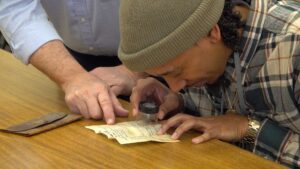Plymouth group can help more families thanks to opioid settlement funds

https://www.wcvb.com/article/how-plymouth-massachusetts-is-using-opioid-funding/61176649
WCVB.com – The brother and sister that Anna Chagnon adopted at birth gave her far more trouble than typical colicky babies.
Born with opioids in their systems, the babies, born two years apart, were both “very tiny. They wouldn’t eat. They were up all night. They would cry a lot,” Chagnon said.
When they were brought to her Lakeville home, the infants both went through withdrawal, requiring a significant amount of care and attention.
“There was a lot of care, nurturing, and scary moments at first,” Chagnon recalled.
But she had help—nurses in the house and support from a local nonprofit, To the Moon and Back, which provided the assistance Chagnon desperately needed.

“You get sent a little bit of information from the Massachusetts Department of Children and Families, a little bit from the doctors, and then you’re on your own. And that can be very challenging and very scary,” she said.
Another mom from Plymouth, Amy Labbe, faced her own challenges when her son moved in with her family at two years old. He too was born with opioids in his system. To the Moon and Back helped her.
“He was nonverbal, he had difficulty hearing, he had dental issues, so he had a lot of complex needs that regular everyday doctors were kind of brushing off as typical toddler behavior until we found this group,” she said.
To the Moon and Back, a Plymouth nonprofit dedicated to the littlest victims of the opioid epidemic, helps families with children born with in-utero substance exposure.
The organization is one of five receiving $50,000 grants from the town of Plymouth. The money is part of the $41 million in opioid settlement funds that started flowing into Massachusetts cities and towns in 2022, though most of the money remains unspent. The settlement funds come from drug manufacturers, distributors, and retailers.
For Theresa Harmon, founder and executive director of To the Moon and Back, the mission is personal. She adopted her oldest, born dependent on opioids, when he was 10 days old.

Thanks to the opioid settlement funds directed to her group by Plymouth, the grant will help hire the nonprofit’s first paid employee.
“This will allow us to help even more families. We’re going to provide ongoing case management specifically to any child here in Plymouth under the age of 18, and be able to follow them and look at their testing and kind of help them develop a plan of action,” she said.
Michelle Bratti, Plymouth’s Commissioner of Health and Human Services, said the town is projected to receive between $3 and $4 million in opioid settlement funds over 15 years.
“What’s your advice to other communities that aren’t moving as quickly as Plymouth?” 5 Investigates’ Mike Beaudet asked.
“Take the leap of faith. The state will support you. Other towns will support you. Just do it. You need to come up with ideas,” Bratti replied.
The state of Massachusetts, which established the framework to disburse the opioid settlement funds, agrees.
“I think Plymouth has done a fantastic job,” said Julia Newhall from the Department of Public Health, who is helping communities spend the opioid settlement funds.
Newhall said communities across the state are much further along in the process than they were a year ago. Most are still in the planning stages, but she says about a quarter of them have started spending the money.
“How would you assess where we stand right now in Massachusetts in terms of cities and towns and spending this money effectively?” Beaudet asked.
“When I assess it against other states, we’re in a really good position,” she said. “I would say in the Commonwealth as a whole, we’re getting there.”
By Mike Beaudet


